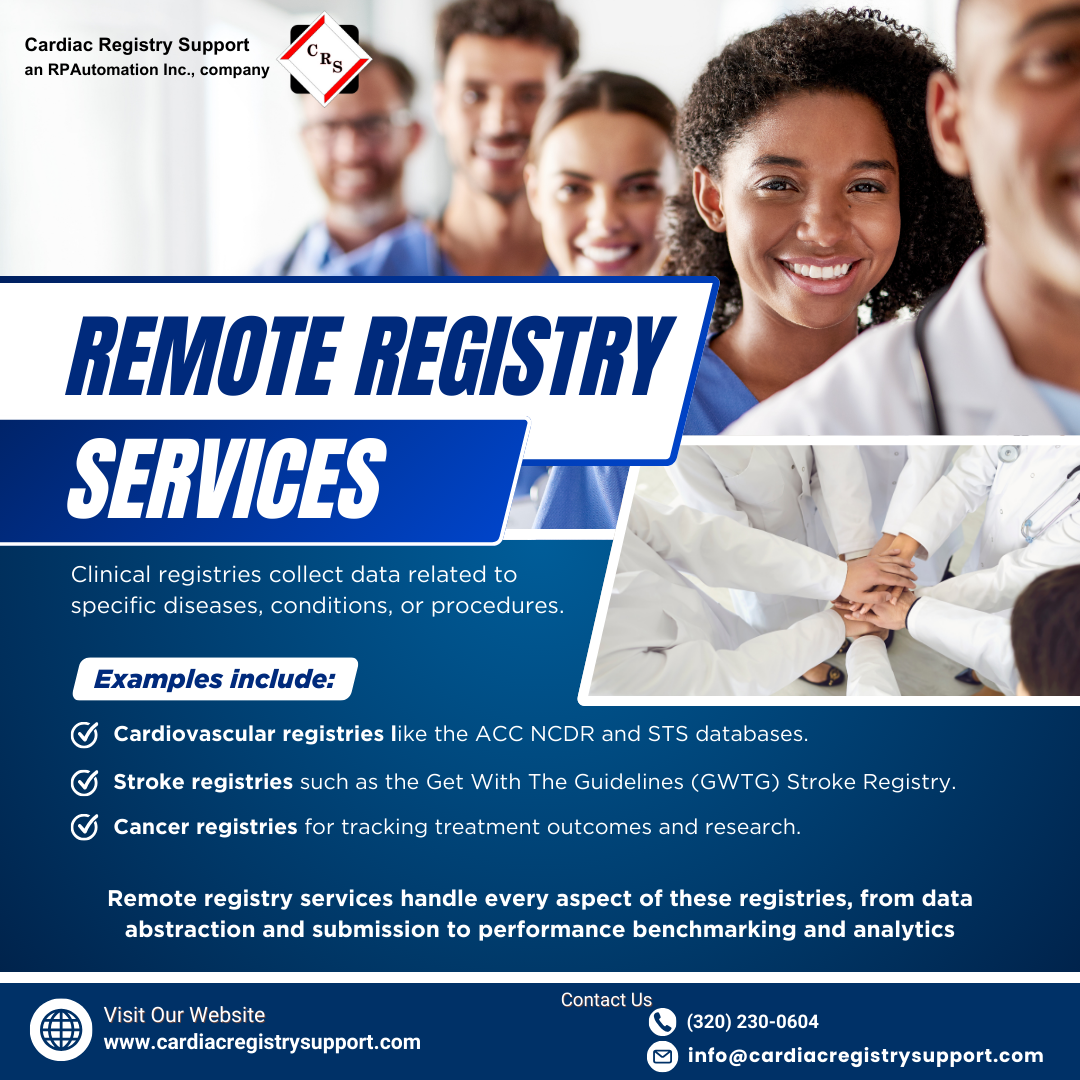The healthcare industry is increasingly relying on data to drive decisions, improve patient outcomes, and meet regulatory compliance standards. One of the key components of this data-driven transformation is registry services, which collect, analyze, and report healthcare data for a variety of purposes. With advancements in technology, remote registry services have emerged as a powerful solution, offering healthcare organizations efficiency, scalability, and cost savings.
What Are Remote Registry Services?
Remote registry services refer to the practice of outsourcing the management, data abstraction, and reporting tasks of clinical registries to specialized professionals or organizations. These services are conducted off-site using secure technologies, allowing healthcare providers to focus on patient care while ensuring their data needs are met efficiently.
Clinical registries collect data related to specific diseases, conditions, or procedures. Examples include:
- Cardiovascular registries like the ACC NCDR and STS databases.
- Stroke registries such as the Get With The Guidelines (GWTG) Stroke Registry.
- Cancer registries for tracking treatment outcomes and research.
Remote registry services handle every aspect of these registries, from data abstraction and submission to performance benchmarking and analytics.
The Key Components of Remote Registry Services
1. Data Abstraction
- Skilled abstractors extract relevant data from electronic health records (EHRs) and other sources, ensuring accuracy and compliance with registry requirements.
2. Data Validation and Quality Assurance
- Rigorous checks are conducted to ensure the data submitted is complete, accurate, and free of errors.
3. Registry Submission
- Data is submitted to clinical registries in a timely manner, meeting all deadlines and formatting requirements.
4. Performance Benchmarking
- Reports are generated to help healthcare organizations compare their performance against national and regional benchmarks.
5. Analytics and Insights
- Advanced analytics provide actionable insights to improve patient care, optimize workflows, and meet quality improvement goals.
Benefits of Remote Registry Services
1. Cost Efficiency
- Managing registries in-house requires hiring and training staff, investing in technology, and dedicating resources to ongoing tasks. Remote registry services eliminate these overhead costs, offering a cost-effective alternative.
2. Scalability
- As healthcare organizations grow, their data needs increase. Remote services can easily scale to handle larger volumes of data without additional investments in staff or infrastructure.
3. Access to Expertise
- Remote registry providers employ highly trained professionals with expertise in data abstraction, coding, and registry requirements. This ensures compliance and high-quality submissions.
4. Time Savings
- Outsourcing registry tasks frees up internal staff to focus on patient care and other priorities, reducing administrative burden.
5. Improved Accuracy
- Specialized abstractors are well-versed in registry guidelines, minimizing the risk of errors and ensuring accurate data submissions.
6. Enhanced Security
- Leading providers of remote registry services use secure technologies to protect patient data and comply with regulations like HIPAA.
How Remote Registry Services Are Revolutionizing Healthcare
Remote registry services are transforming the way healthcare organizations manage and utilize data. Here’s how:
1. Enabling Data-Driven Decision-Making
- By providing timely and accurate data, these services empower healthcare leaders to make informed decisions that improve care delivery and operational efficiency.
2. Facilitating Participation in Quality Programs
- Many quality improvement programs, such as CMS’s Value-Based Purchasing Program, require data submission to clinical registries. Remote registry services simplify participation and ensure compliance.
3. Supporting Research and Innovation
- Registry data is a valuable resource for clinical research, helping organizations contribute to medical advancements and innovation.
4. Reducing Disparities in Care
- By benchmarking performance against peers, healthcare organizations can identify disparities and implement strategies to address them.
Choosing the Right Remote Registry Service Provider
Selecting a provider for remote registry services is a critical decision. Consider the following factors:
1. Experience and Expertise
- Look for providers with a proven track record in managing clinical registries relevant to your organization’s needs.
2. Compliance and Security
- Ensure the provider complies with industry standards like HIPAA and uses robust security measures to protect patient data.
3. Technology and Tools
- Advanced tools for data abstraction, validation, and analytics can enhance the quality and efficiency of registry services.
4. Customization
- The provider should offer flexible solutions tailored to your organization’s unique requirements.
5. Customer Support
- Reliable customer support is essential for addressing issues and ensuring smooth operations.
Overcoming Challenges in Remote Registry Services
While the benefits of remote registry services are substantial, there are challenges to consider:
1. Data Integration
- Integrating data from multiple EHR systems can be complex. Work with providers experienced in handling diverse data sources.
2. Communication
- Clear communication between the provider and your organization is essential to align goals and expectations.
3. Change Management
- Transitioning to remote services requires buy-in from stakeholders and proper change management strategies.
Final Thoughts
Remote registry services are a game-changer for healthcare organizations looking to optimize data management, reduce costs, and improve patient outcomes. By outsourcing registry tasks to experienced professionals, organizations can focus on what matters most: delivering high-quality care.
As the demand for data-driven decision-making continues to grow, remote registry services will play an increasingly vital role in the healthcare landscape. Partnering with the right provider like Cardiac Registry Support ensures that your organization stays ahead of the curve and maximizes the value of its data.


